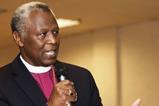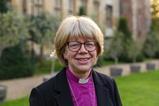Premier Christianity uses cookies Read our cookie policy.
By 2025-11-12T09:24:00+00:00
The new CofE attendance figures prove that the claims made by Bible Society’s Quiet Revival report just don’t hold up, says Tim Wyatt
Source: blackwhite.picture
Normally, church attendance statistics are the preserve of the nerds and the masochists. Every year numbers come out; every year they are worse than the year before. But since Bible Society launched their Quiet Revival report earlier this year, the question of how many people are actually going to church in Britain has taken on fresh urgency.
The core claim of Bible Society’s research was that between 2018 and 2024, there had been a hitherto unnoticed explosive growth in churchgoing. The numbers across the UK had rocketed by 56 per cent, they said, shooting up from 3.7m to 5.8m.
I’ll level with you – I was a quiet sceptic from the day the press release dropped. I knew that church attendance had been in steady, unerring decline for literally generations in the UK. This trend was so established it was going to take a lot more than one YouGov poll to convince me things had changed.
Was it really credible that churchgoing had shot up by historically unprecedented rates in a handful of years – and basically nobody had noticed?
It’s hard to be the party-pooper, the only one not getting carried away. Almost everyone else in the UK Church was giddy with excitement over Bible Society’s claims – and why not? Who wants to fuss about the statistics when there’s good news to celebrate?
But truth matters, even if that truth is not the story we long to be telling. And luckily, we don’t just have to either believe or not believe the Quiet Revival polling – we can verify it against other measures of church attendance. One of the best just came out a few weeks ago, and I’m afraid it’s bad news.
Every October, the CofE tells its vicars to count everyone who comes to church. It then averages this out to produce a very reliable and robust average weekly attendance figure. This is not simply asking a small sample of 1,000 Britons in an online poll: “Do you go to church?”. This is literally counting bums on seats in thousands of parishes up and down the land.
Growth of any kind is both worthy of celebration and historically unusual
Last year, 702,000 people worshipped in Anglican churches on average. This number is actually growing. It’s up 1.6 per cent from the previous year and is more than double the covid-affected nadir of 2020. In fact, it’s grown for four years in a row, which is historically unprecedented for the CofE.
Probably, some of this was initially previous churchgoers who lost the habit over the pandemic coming back. But each year that growth continues and Covid-19 recedes into the rear-view mirror, it becomes more likely this is ‘real’ church growth.
This is, of course, something to celebrate. What it most resolutely is not, however, is evidence to support the Quiet Revival hypothesis. Many people have observed a renewed openness to Christianity in British culture, and perhaps this is behind the CofE’s uptick in attendance. But the core claim of the Quiet Revival is not that the trickle of people leaving church has been replaced by a trickle coming in; it’s that there has been an unnoticed explosion of growth.
Perhaps the revival is real – but it’s just bypassing the Anglican church. The CofE is still the largest denomination in Britain and produce the most statistically robust church attendance data by far. But perhaps the Anglicans are just too fuddy-duddy and traditionalist to capture this fresh and radical move of the Spirit.
Many commentators have explained away the stubbornly non-revivalist nature of CofE stats by saying this explosive growth is taking place in other churches – Pentecostal, independent evangelical and Catholic churches – who don’t have the resources to count attendance so thoroughly.
Maybe. Except that the Bible Society’s original poll also included a breakdown of what place the CofE holds in UK churchgoing. In 2024, it supposedly amounted to 34 per cent of attendance. If we believe the polling numbers, this equates to 1.9m Anglicans going to church.
You don’t have to have a PhD in mathematics to spot that 702,000, the number actually counted by vicars attending parish churches last year, is an awful lot smaller than the 1.9m the Quiet Revival claimed.
The numbers are in, and the quiet revival is not happening
The same is true of Catholics. According to the Bible Society, in 2024 31 per cent of churchgoers went to a Catholic church, which should have amounted to 1.8m people. But the Catholics also actually count who comes to church, and their latest figures for 2024 showed 575,000. This is a modestly impressive 4.5 per cent increase since 2023, but it most certainly is not explosive revival-style growth.
We don’t have to hum and haw about this anymore. The numbers are in, and the quiet revival is not happening. To maintain the Bible Society’s claim you either have to believe that one YouGov poll is more accurate than decades of professional statistical reports from both the Anglican and Catholic church. Or you have to believe that while those two enormous denominations have been declining or stagnant, there has been astonishing growth – in the order of millions of new believers – across the plethora of smaller churches who don’t produce their own stats.
Neither claim is remotely credible, unfortunately. I wish it were not the case, but Britain is not the grips of a quiet revival.
But do not let this sober conclusion obscure the actual truth: churches are growing! It’s not by the 50 per cent or more that the Bible Society told us they were, but growth of any kind is both worthy of celebration and historically unusual.
So, let’s continue to drill into reliable, robust numbers and ponder how we can turn the one, two or five per cent growth that churches are seeing into something a bit closer to actual revival.
Let’s not allow the giddy, unsubstantiated claims of one poll to distract us from the real work of multiplying the incredibly encouraging signs of turnaround that are all around us.
God’s Church in Britain is alive and growing, for perhaps the first time in my lifetime. And that is good news worth celebrating! 


Grab this Deal!
We’re celebrating a remarkable journey from our humble beginnings as Buzz in the 1960s to the vibrant, multi-platform publication we are today. One thing has remained constant: our commitment to connecting faith with the world around us. To celebrate our birthday, we are offering you a Print and Digital subscription for just £24 your first 12 months!
Subscribe Today
*Offer applies in UK only, but check here for our overseas offers
2025-10-17T11:35:00Z
Rev David Sims – otherwise known as @tiktok_vicar – posted a short video on social media asking if anyone wanted a Bible. He never imagined he’d have to start a crowdfunding campaign to meet the demand
2025-08-07T10:50:00Z
On the day that a national newspaper ran a front-page story hailing a “spiritual U-turn” among 16-24-year-olds, evangelist Greg Downes was preaching in a church in Cornwall. When five people responded to the gospel, he saw the headline play out in real time. And it’s not an isolated incident, he says
2025-05-30T08:44:00Z
With reports of renewal gathering pace, Christian leaders from a variety of churches and locations across the UK report on what they’re witnessing
2025-11-11T10:00:00Z
As the BBC faces mounting allegations of bias and a potential $1billion lawsuit from Donald Trump, Dr Jenny Taylor says the corporation needs to remember its Christian roots and get back to valuing the truth
2025-11-10T16:06:00Z
Cornwall’s only Christian festival has been threatened with closure. Here, one 20-year-old volunteer shares how the event has impacted her own walk with Jesus, and urges other Christians to consider investing in the spiritual landscape of one of the UK’s most under-served regions
2025-11-07T16:33:00Z
As YouVersion’s Bible app approaches one billion installs, founder Bobby Gruenewald explains why the world’s most popular Bible app has remained completely free and non-commercialised despite being worth billions
Site powered by Webvision Cloud

